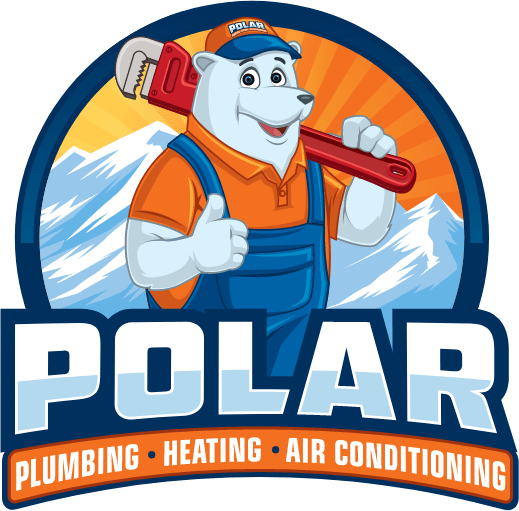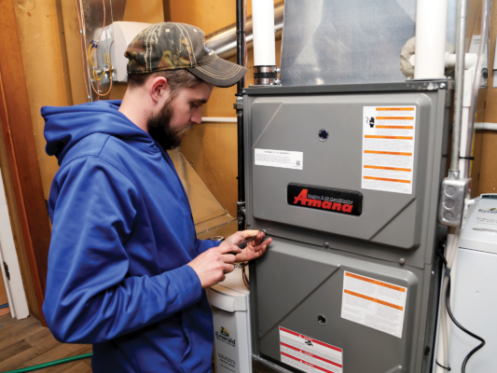Anyone looking to purchase a new furnace will have to make the choice of whether to buy an oil furnace or a gas furnace. While both types of furnaces are generally adequate to heat nearly any type of home, there are a number of differences between them that might make one or the other a better choice for a particular home. Here are some of the most important differences between oil and gas furnaces.
How They Work
Gas and oil furnaces both work by forcing heated air throughout the home using a duct system that reaches all areas of the home. A thermostat connected to the furnace unit constantly monitors the temperature of the air in the home and kicks on the heating system when the temperature falls below a point set by the homeowner. The heated air is then circulated inside the home while the toxic combustion gases created by the burning of the fuel are directed outside of and away from the home.
With both types of furnaces, a burner in the combustion chamber of the furnace lights up and creates heat that is directed into the home. Gas furnaces accomplish this by feeding natural gas through the burner at a steady rate to create heat. Oil furnaces can use either heated air or heated water traveling through pipes to warm the home.
Type of Fuel Used
The most noticeable difference between oil and gas furnaces is the type of fuel that is used for heating the home. Gas furnaces use natural gas as their fuel and are attached to a gas utility’s supply line during installation. This means that there is always a supply of gas available as long as you pay your utility bill. These types of furnaces have been in use for decades and are considered a safe and effective way to heat a home.
Oil furnaces use fuel oil stored in a tank to provide heat for a home. The oil is atomized and mixed with air by the furnace to create the right conditions for it to become flammable and create heat. With these types of furnaces, you must monitor the amount of fuel oil you have on hand and schedule regular deliveries of fuel oil to ensure that you have enough oil to continue heating your home. Polar Plumbing, Heating & Air Conditioning of Newburgh, NY has extensive experience in installing both types of furnaces.
Energy Efficiency of the Equipment
The energy efficiency of the furnace you choose is important because higher energy efficiency means lower heating costs during the colder months. You can find high-efficiency furnaces in both the natural gas and oil varieties, but it is commonly believed that a gas furnace is more energy efficient than one that burns oil. A furnace’s annual fuel utilization efficiency (AFUE) rating lets you see exactly how fuel efficient a particular furnace model is, with higher numbers indicating greater fuel efficiency.
Cost of the Equipment
There can be a significant difference in the price of a gas furnace versus the price of an oil furnace. In most cases, the cost of purchasing an oil furnace will be less than purchasing a comparable gas furnace. This is generally because a gas furnace has more technological advancements and greater efficiency than an oil furnace designed for the same size and type of home.
Cost of the Fuel
There can also be big differences in the cost of using fuel oil to heat your home versus using natural gas. In the past few years, oil prices have fluctuated wildly on a nearly weekly basis, making it difficult for homeowners to anticipate the cost of heating their homes over the winter if they use an oil furnace. Natural gas prices have been more stable, allowing homeowners with gas furnaces to more accurately estimate what their home heating costs will be.
Safety of the Furnace
Safety is another important element that should be taken into consideration when purchasing an oil or gas furnace. Natural gas is a highly flammable substance, so repairs and maintenance for a gas furnace should always be performed by those with experience, like the experts at Polar Plumbing, Heating & Air Conditioning, to reduce the risk of explosions or fire.
Fuel oil, while not as flammable as natural gas, still represents a significant fire risk if the oil leaks and comes into contact with an ignition source. Cleaning up spilled fuel oil can be a hazardous task that requires specialized equipment and safety gear. It is also important for both types of furnaces to be maintained and vented properly so that they do not leak dangerous gases like carbon monoxide into the home.
Maintenance for the Furnace
Both types of furnaces require regular maintenance to continue performing optimally, but the maintenance for oil furnaces is often more time-consuming than maintenance for gas-burning furnaces. This is because gas burns more cleanly than oil, leading to less of a need for regular cleanings to remove soot and other by-products of burning fuel. On the other hand, gas furnaces are generally more technologically advanced than oil furnaces and may require a more experienced service technician for the unit to be maintained properly.
Filters for the Furnace
The cost of filters for both types of furnaces is comparable when looking at the number of contaminants they can remove from the air. However, air filters for oil furnaces must be changed more frequently because of the increased soot produced by burning oil. The pros at Polar Plumbing, Heating & Air Conditioning can help you decide on a furnace maintenance and filter change schedule that best meets your needs. Contact us today or check out our website for more information on proper furnace maintenance.
Lifespan of the Equipment
Both oil and gas furnaces are considered to be some of the longest-lasting equipment available for a home. While the initial cost of purchasing the equipment and having it installed can be expensive, you will not have to replace the unit for many years if it is maintained properly. These costs are spread out even further for those who purchase an oil-burning furnace, as they tend to last between five and 10 years longer than a comparable gas-burning furnace.
Reach Out for Expert Help Today
There are advantages and disadvantages to buying either type of furnace for your home, so the ultimate decision will come down to your personal preference and what is available around you locally. In some areas, accessibility to natural gas lines or available space for a fuel oil tank may be the deciding factor for what type of furnace you choose to purchase. In other areas, there are no barriers to choosing either type of furnace, so you can choose the optimal one for the current needs of your home and family.
The experts here at Polar Plumbing, Heating & Air Conditioning of Newburgh, NY can help you decide on the right type of furnace for your home, as well as set up an installation and a regular maintenance schedule for you. We also provide cooling services, plumbing services, a wide variety of maintenance services, and leak detection services. To learn more about what we offer, contact us today!

